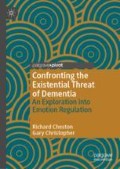Abstract
A diagnosis of dementia threatens not only many of the core aspects of what it is to be human, but leads, through a progressive deterioration, to death. Dementia thus represents an existential threat that creates profound emotional and psychological challenges for those who are directly affected by the illness. In this chapter, we argue that the psychological threat dementia represents needs to be viewed within the context of research from social psychology, and in particular Terror Management Theory (TMT). TMT proposes that humans experience a basic psychological conflict that results from having a self-preservation instinct on the one hand while on the other hand also knowing that death is inevitable. As a way of managing the distress that would otherwise arise from this knowledge, a series of defences operate to build psychological resilience and to reduce or to eliminate awareness of death. These defence strategies include the person investing themselves in religious and cultural belief systems which hold the possibility of spiritual immortality, as well as internal psychological processes such as repression and avoidance. We explore how the TMT framework might help us to make sense out of the experiences of people living with dementia.
Access this chapter
Tax calculation will be finalised at checkout
Purchases are for personal use only
Notes
- 1.
- 2.
- 3.
Roughly 50 million people across the world are living with dementia in 2017, with this number expected to double in 20 years time, reaching 75 million people in 2030 and over 130 million by 2050 (https://www.alz.co.uk/research/statistics, p. 11).
- 4.
- 5.
References
Kessler, E., Bowen, C. E., Baer, M., Froelich, L., & Wahl, H. (2012). Dementia worry: A psychological examination of an unexplored phenomenon. European Journal of Ageing, 9(4), 275–284. https://doi.org/10.1007/s10433-012-0242-8.
Ouimet, M. A., Dendukuri, N., Dion, D., Beizile, E., & Elie, M. (2004). Disclosure of Alzheimer’s disease: Senior citizens’ opinions. Canadian Family Physician, 50(12), 1671–1677.
Bamford, C., Lamont, S., Eccles, M., Robinson, L., May, C., & Bond, J. (2004). Disclosing a diagnosis of dementia: A systematic review. International Journal of Geriatric Psychiatry, 19(2), 151–169.
Pinner, G., & Bouman, W. P. (2003). Attitudes of patients with mild dementia and their carers towards disclosure of the diagnosis. International Psychogeriatrics, 15(3), 279–288.
Albinsson, L. (2002). A palliative approach to dementia care: Leadership and organisation, existential issues and family support, Comprehensive Summaries of Uppsala Dissertation from the Faculty of Medicine, 1196.
Albinsson, L., & Strang, P. (2002). A palliative approach to existential issues and death in end-stage dementia care. Journal of Palliative Care, 18(3), 168–74.
Albinsson, L., & Strang, P. (2003). Existential concerns of families of late-stage dementia patients: Questions of freedom, choice, isolation, death and meaning. Journal of Palliative Medicine, 6(2), 225–235.
Solomon, S., Greenberg, J., & Pyszczynski, T. (2015). The worm at the core: On the role of death in life. London: Allen Lane.
Becker, E. (2007). The Denial of Death. Simon and Schuster.
Greenberg, J., Pyszczynski, T., Solomon, S., Rosenblatt, A., Veeder, M., et al. (1990). Evidence for Terror Management Theory II: The effects of mortality salience on reactions to those who threaten or bolster the cultural worldview. Journal of Personality and Social Psychology, 58, 308–318.
Harmon-Jones, E., Greenberg, J., Solomon, S., & Simon, L. (1996). The effects of mortality salience on intergroup bias between minimal groups. European Journal of Social Psychology, 26, 677–81.
Nelson, L. J., Moore, D. L., Olivetti, J., & Scott, T. (1997). General and personal mortality salience and nationalistic bias. Personality and Social Psychology Bulletin, 23, 884–92.
Alicke, M. D., & Sedikides, C. (Eds.). (2011). Handbook of self-enhancement and self-protection. Guilford Press.
Greenberg, J. (2008). Understanding the vital human quest for self-esteem. Perspectives on Psychological Science, 3(1), 48–55.
Greenberg, J., Pyszczynski, T., & Solomon, S. (1986). The causes and consequences of a need for self-esteem: A terror management theory. In Public self and private self (pp. 189–212). Springer, New York, NY.
Kitwood, T. (1997). The concept of personhood and its relevance for a new culture of dementia care. Care-Giving in Dementia: Research and Applications, 2, 3–13.
Kitwood, T. M. (1997). Dementia reconsidered: The person comes first. Buckingham: Open University Press.
Author information
Authors and Affiliations
Corresponding author
Rights and permissions
Copyright information
© 2019 The Author(s)
About this chapter
Cite this chapter
Cheston, R., Christopher, G. (2019). Dementia as an Existential Threat. In: Confronting the Existential Threat of Dementia. Palgrave Pivot, Cham. https://doi.org/10.1007/978-3-030-12350-5_3
Download citation
DOI: https://doi.org/10.1007/978-3-030-12350-5_3
Published:
Publisher Name: Palgrave Pivot, Cham
Print ISBN: 978-3-030-12349-9
Online ISBN: 978-3-030-12350-5
eBook Packages: Behavioral Science and PsychologyBehavioral Science and Psychology (R0)

